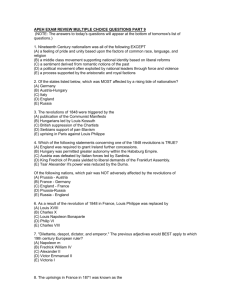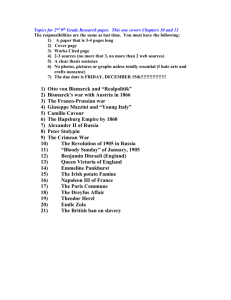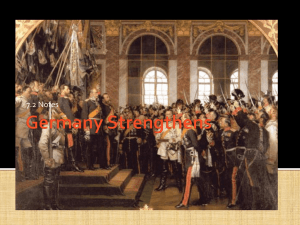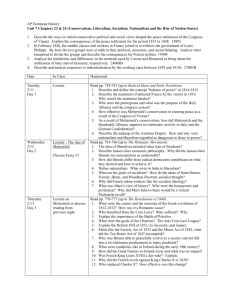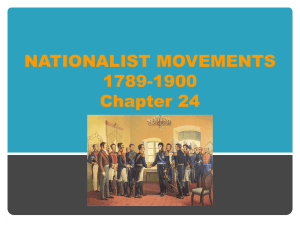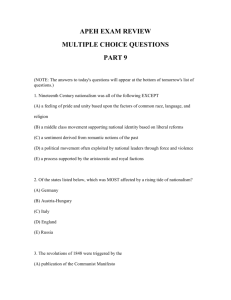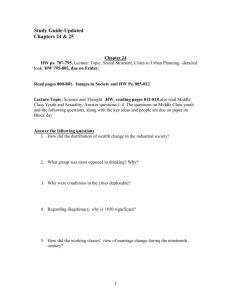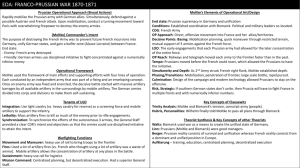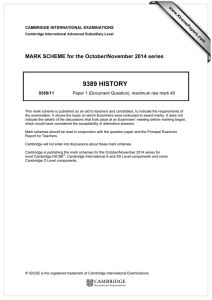Bismarck Investigation – Liberalism, Conservatism and Nationalism
advertisement
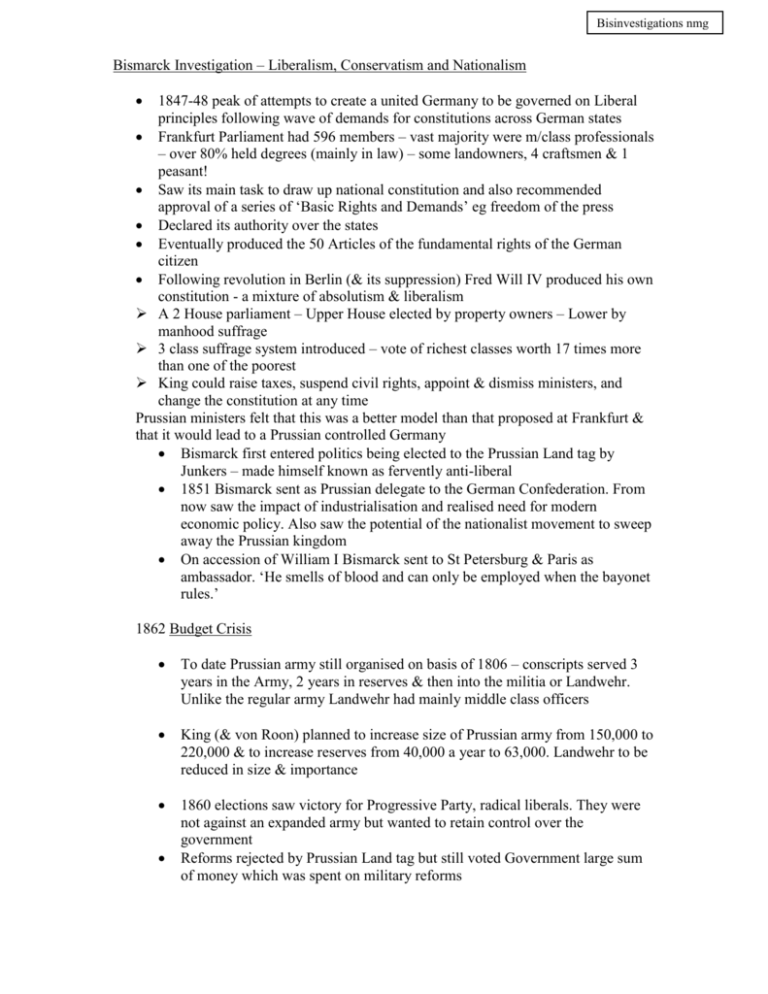
Bisinvestigations nmg Bismarck Investigation – Liberalism, Conservatism and Nationalism 1847-48 peak of attempts to create a united Germany to be governed on Liberal principles following wave of demands for constitutions across German states Frankfurt Parliament had 596 members – vast majority were m/class professionals – over 80% held degrees (mainly in law) – some landowners, 4 craftsmen & 1 peasant! Saw its main task to draw up national constitution and also recommended approval of a series of ‘Basic Rights and Demands’ eg freedom of the press Declared its authority over the states Eventually produced the 50 Articles of the fundamental rights of the German citizen Following revolution in Berlin (& its suppression) Fred Will IV produced his own constitution - a mixture of absolutism & liberalism A 2 House parliament – Upper House elected by property owners – Lower by manhood suffrage 3 class suffrage system introduced – vote of richest classes worth 17 times more than one of the poorest King could raise taxes, suspend civil rights, appoint & dismiss ministers, and change the constitution at any time Prussian ministers felt that this was a better model than that proposed at Frankfurt & that it would lead to a Prussian controlled Germany Bismarck first entered politics being elected to the Prussian Land tag by Junkers – made himself known as fervently anti-liberal 1851 Bismarck sent as Prussian delegate to the German Confederation. From now saw the impact of industrialisation and realised need for modern economic policy. Also saw the potential of the nationalist movement to sweep away the Prussian kingdom On accession of William I Bismarck sent to St Petersburg & Paris as ambassador. ‘He smells of blood and can only be employed when the bayonet rules.’ 1862 Budget Crisis To date Prussian army still organised on basis of 1806 – conscripts served 3 years in the Army, 2 years in reserves & then into the militia or Landwehr. Unlike the regular army Landwehr had mainly middle class officers King (& von Roon) planned to increase size of Prussian army from 150,000 to 220,000 & to increase reserves from 40,000 a year to 63,000. Landwehr to be reduced in size & importance 1860 elections saw victory for Progressive Party, radical liberals. They were not against an expanded army but wanted to retain control over the government Reforms rejected by Prussian Land tag but still voted Government large sum of money which was spent on military reforms 1861-2 Land tag continued to protest against military reforms – King wanted 3 years military service, Liberals compromised on 2 years By 1862 Liberals controlled 80% of seats King considered shutting down Land tag or abdicating in favour of more liberal minded son King & Junkers determined to keep control of army – 65% of officers drawn from landowning classes – 3 years service would maintain control Liberals wanted to see Germany united but believed that King & Army should be under their control They wanted a Landwehr, officered by men from the middle classes who would more likely fight for Germany rather Junkers whose loyalty was to Prussia Bismarck appointed as Minister-President – made his ‘Blood & Iron’ speech Told parliament that military reforms would be financed from taxes Liberal opposition argued that people would refuse to pay – Bismarck replied that 200,000 soldiers were available to collect taxes Money raised over next 4 years! War with Austria – the end of Liberalism in Germany? Elections held in Prussia following success against the Austrians – Conservatives swept to success as Liberals lost heavily Indemnity Bill legalised all laws retroactively – passed with handsome majority Bismarck spoke of need for govt to work jointly with parliament – implicit acceptance of parliament’s rights (Stiles) Unity did not last – formation of National Liberal Party pledged to support move to unity but also to maintain Liberal principles eg Free Trade. Many Junkers saw Bismarck as traitor to his class – now opposed him Less reactionary Junkers formed the Free Conservatives who were to work with the National Liberals The North German Confederation – political basis Established federal unity between member states & central authority States kept their own rulers, laws & local assemblies. Own legal & admin systems, local taxes paid for bureaucracy & provided education Central authority lay in Bundesrat (Federal Council) – states had votes proportionate to their size (Prussia had 17/43!) King of Prussia was president & commander in chief Reichstag elected by universal manhood suffrage but Federal Chancellor was not responsible to it. Allowed right to pass annual budget but military spending excluded (accounted for 90% of new Confederation’s spending!) Struggle over this continued - eventually Reichstag would gain some control by 1872 Bismarck was opposed to idea of parliamentary government on the British model – had a very low opinion of the political abilities of his fellow Germans The German Empire, 1870
